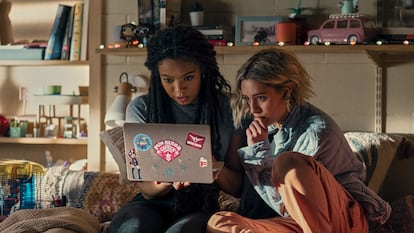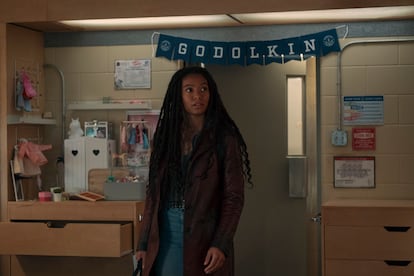‘Gen V,’ the teenage, feminist spinoff of ‘The Boys’
The Amazon Prime Video show set at a college for superheroes departs from the original series with its main characters’ powers and plots and offers an even bloodier twist on ‘The Boys’

What were the corrupt, sociopathic, egomaniacal superheroes of The Boys like before they became corrupt? How do you deal with superpowers in a world full of competition? And how do you do it during adolescence, a time characterized by change and inner struggles? The great success of The Boys prompted Amazon Prime Video to greenlight a spinoff story, the second after the animated fiction The Boys Presents: Diabolical. Gen V tells the story of a group of young people who have acquired superpowers through injections of compound V, which gives powers to superheroes in the fictional universe based on the comics of the same name. The show depicts their battles with their own demons and those of their peers, and their fight against those who try to use them for their benefit at a college for superheroes. The finale of the first season will drop next Friday on Amazon Prime Video.
Gen V starts with young Marie’s arrival at this exclusive college. The young woman discovered her power to control blood in the most traumatic way possible: it coincided with her first menstruation. Before the show’s first five minutes have gone by, the series makes the universe in which it takes place clear with two bloody deaths. Gen V takes place in the same world as The Boys, but showrunners Michele Fazekas and Tara Butters made sure to give the program an identity of its own, distinct from the original series. “Our heroes are superheroes who haven’t been corrupted yet. They are still young and idealistic, like we are when we start college and you see the world in black and white, there are bad guys and good guys,” Michele Fazekas explained in a video call interview last Monday.
They also wanted to distance themselves from the original series through the character’s superpowers. “In The Boys, the superpowers are metaphors for fame culture and political issues and capitalism. The ones in our series are related to problems that are specific to youth,” the producer explains. Thus, Marie’s roommate Emma’s power to change her size is related to an eating disorder. Another character, Sam, deals with mental illness. Jordan can change from male to female and vice versa, in a metaphor for gender identity.

Fazekas and Butters already had experience when it came to taking over a spinoff series set within a universe that has a lot of history behind it. They were also showrunners on Agent Carter, a production tied to Marvel’s Captain America universe. “We always wanted to ensure that even if you’ve never seen a Marvel movie, you could still enjoy the series. And if you’ve never seen The Boys, you can still enjoy Gen V. For that [to happen], you have to have interesting characters and stories you can relate to. Then it’s the same universe, as gory, outrageous and fun,” Fazekas explains. Some of the most representative characters from The Boys, such as Profundo or A-Train, even appear in brief cameos so that the viewer doesn’t forget that the protagonists of Gen V share the same universe.
However, the tone, the characters’ decisions and the stories of Gen V have a more feminine, even feminist, perspective than The Boys. Fazekas confirms that feminist undercurrent, a product of a diverse and female-heavy writers’ room, which is also reflected in other areas of the show, from production to direction. “In the first episode, Marie’s power manifests itself when she gets her period. As I read it, this series really intrigued me, because people still feel uncomfortable talking about and watching this topic. We had an interesting conversation in the writers’ room, because some men thought that when a girl has her period it’s like her sex life begins, and we women told them no, no way, it’s not like when a guy has a wet dream, it’s a very different experience. [The fact] that we’re still having that conversation in 2023... That’s why I love that the series starts like that.”

Other scenes show sexual violence toward women. In the first episode, Emma is coerced into having sex after becoming tiny, so on screen we see a tiny woman clutching a giant penis. In another episode, Marie is about to be sexually coerced and, without going into detail, will use her power to control blood to defend herself against her attacker. “These are situations that the women in the writers’ room agreed with; if it hadn’t happened to them, they knew people who had been in situations with men that were that dangerous.”
Although Gen V is inspired by a story arc in The Boys comics, the show only follows it in a very superficial way. Fazekas explains that they had total freedom when it came to creating the story and characters. “I had the same experience at Marvel. There, they have years of comics published and millions of different versions of the same character, so they never tell you: you have to do it like this. It wouldn’t make sense. Plus, it’s a different medium.” In addition, there were no limits on how graphic the show could be when it came to its many gory and violent scenes. “The only limit is the one we impose on ourselves: we can’t be violent just for the sake of doing something gory. No matter how crazy things get in The Boys, there always has to be a reason for it. If it’s not underpinned by reality, it’s going to come off as empty and stupid. Even if Sam envisions a puppet fight [as happens in the fifth episode], which might seem ridiculous, it makes sense for his character in the show. I’m sure Amazon has limits on what you can see, but we’re not there yet,” the showrunner explains.

In an entertainment industry with so many stories about superheroes in film and on television, one might be surprised at how well-received the two series have been. What makes them different? “That’s a good question, because I think there are a lot of superhero stories, too, and it was a risk to do another series about superheroes. I was worried that people were getting tired of it already. But I think what The Boys does really well is take everything you know about these stories and turn it on its head. These people have superpowers, okay, but what are they really like? Because some of them would be psychopaths, some of them would be horrible people... they’re not all going to be people with impeccable morals,” Michele Fazekas says.
Sign up for our weekly newsletter to get more English-language news coverage from EL PAÍS USA Edition
Tu suscripción se está usando en otro dispositivo
¿Quieres añadir otro usuario a tu suscripción?
Si continúas leyendo en este dispositivo, no se podrá leer en el otro.
FlechaTu suscripción se está usando en otro dispositivo y solo puedes acceder a EL PAÍS desde un dispositivo a la vez.
Si quieres compartir tu cuenta, cambia tu suscripción a la modalidad Premium, así podrás añadir otro usuario. Cada uno accederá con su propia cuenta de email, lo que os permitirá personalizar vuestra experiencia en EL PAÍS.
¿Tienes una suscripción de empresa? Accede aquí para contratar más cuentas.
En el caso de no saber quién está usando tu cuenta, te recomendamos cambiar tu contraseña aquí.
Si decides continuar compartiendo tu cuenta, este mensaje se mostrará en tu dispositivo y en el de la otra persona que está usando tu cuenta de forma indefinida, afectando a tu experiencia de lectura. Puedes consultar aquí los términos y condiciones de la suscripción digital.









































